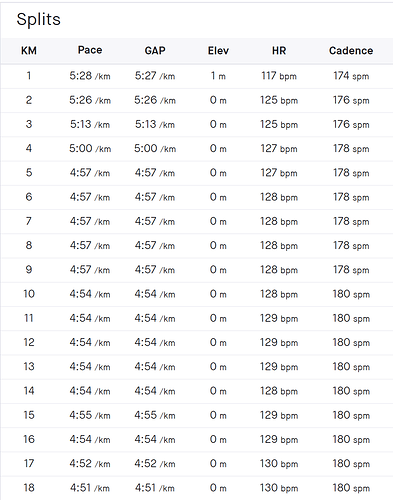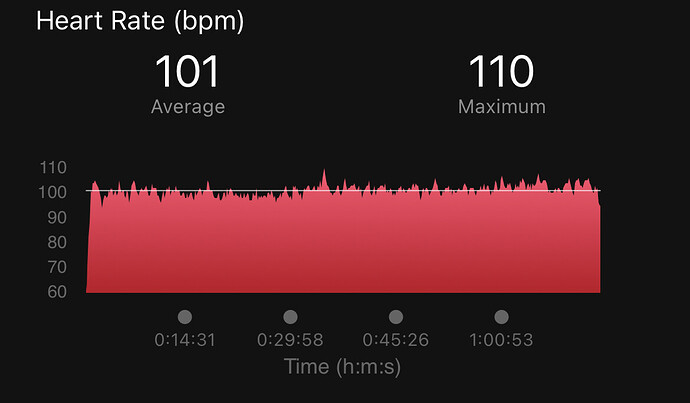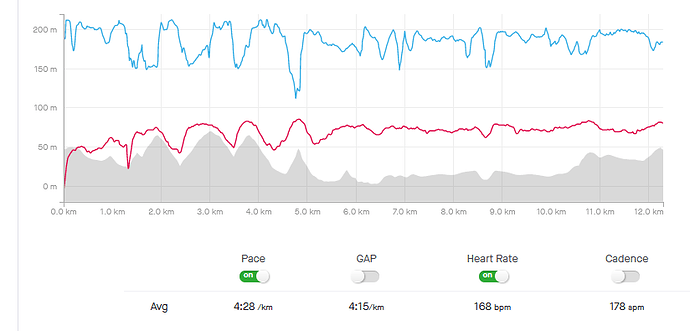That is the game here!
So for those of us with hearts of a hamster, we’re screwed?
I’d have thought the whole point of a Karvonen 75% method is to find the quickest time?
As that cap isn’t personal?
If I walk a 10km, That’s going to take me 2.34hrs
Let’s say 80bpm, or ~11k beats - so it’s more Efficient to run a 10km than to walk it ![]()
Hmm…I get it.
Find the fastest pace for the lowest HR in Z2.
The same argument be made for those of us with a low MHR or who are getting on a bit.
It also kind of depends if we’re aiming for LT1 or LT2 as the boundary of aerobic.
Personally, the point of this was to improve my speed at the speed of my endurance runs.
I’m only really “racing” myself here
The 10km you gave me to do, was faster with an average of 8 beats higher, but I wouldn’t go out and run at the speed/HR every day.
It’s only a bit of fun at the end of the day.
Let’s just delete the thread like it never existed.
Fun… Fun… There was no fun  . I was practically walking and my HR still thru the roof
. I was practically walking and my HR still thru the roof
I’m trying to work out the pace I have to run to take down @TriCurious 
Yeah!
I get that ![]()
![]()
![]()
The point for me is to run 10km quicker for 145bpm.
The 155bpm one I did felt easy, but more like RPE4.
I don’t like there.
RPE7 was today.
RPE5-6 are never there.
Easy run is RPE3.
Walk is RPE1.
Slow run is RPE2.
Haha can’t be much in it 
Did my hilly run again today, lengthened it from 3 reps (600mtrs) to 4 reps (800mtrs) first 10k was…
07/02 66:10 @ 135 600mtrs climb, biting easterly & snow flurries
My best easy effort yet - gradually increasing pace over 18km keeping HR at 130 or below, successfuly hitting 5m/km
So I was able to get some old data from a lab test I did at the HPU at Essex Uni back in 2013, so back when I was 40.
For context, I was fully in the low carb camp at that stage.
"Your thresholds occurred at a high percentage of your peak power, with lactate threshold occurring at 81% 328W 139bpm (ideally 50-60%) and anaerobic threshold occurring at 93% 377W 150bpm of peak power (ideally 70-80%). This is indicative of a suppressed maximal value. Whilst having high threshold values is positive in regards to endurance performance, further progression in these values is limited without progression in top end performance. "
And then with regards to carb/fat utilisation
“Throughout the test, your RER values (respiratory exchange ratio) remained low, only exceeding 1.00 in the last 5 seconds of the test. Respiratory exchange ratio is the ratio of oxygen to carbon dioxide and is calculated breath by breath throughout the test. This value can tell us a lot about fuel utilisation during the test. An RER of 1.00 indicates 100% carbohydrate utilisation. A low RER can be an indication that your body is efficient at oxidising fats and sparing muscle glycogen during prolonged exercise, which of course is of benefit to your endurance performance. However, a low RER towards the top end of your performance suggests that you are glycogen depleted, which is likely as a result of your low carbohydrate diet”
Basically confirming I was a fat burning, diesel machine then and still am now
it’s like you knew the hills were coming and started to get scared
Sounds perfect for Ironman?
10 k
54 mins
Quite hilly
Hr 140
Too much chatting !
I’ve done a few of these now. Dropped my HR cap to 130 as I think getting more efficient at that HR is more useful than pushing to 140.
| date | time | pace | av hr | max hr | cad | str |
|---|---|---|---|---|---|---|
| 14-Jan | 41:25 | 04:09 | 137 | 148 | 160 | 1.51 |
| 28-Jan | 43:38 | 04:22 | 128 | 142 | 158 | 1.45 |
| 05-Feb | 43:25 | 04:20 | 129 | 142 | 158 | 1.46 |
| 12-Feb | 43:29 | 04:21 | 129 | 136 | 159 | 1.45 |
Things I have learnt so far;
- My HRM (or my heart!?) randomly jumps 10bpm sending me over range. I am running to feel rather than slavishly to the numbers
- I increase effort up hill more than I realised. I am not running flat routes, and keeping HR down on hills is really hard
- I sub-consciously increase my pace in the last mile. Similar to above, I have to consciously slow myself down for the last mile to keep the HR down.
- I am faster on these runs than a normal ‘easy’ run, even though the AvHR may be similar. Something about concentrating on running efficiently to keep the HR down.
Remember that doesn’t necessarily mean you’re running more efficiently, just that your heart is beating less, only if you define efficiency by heart rate is that the case. You could also define efficiency by lowest calories burnt per km, or lowest watts produced per km, or minimum wear on the muscles per km etc. Just be careful what you’re optimising for.
(oh and your HR won’t be jumping 10beats, so I’d question the entire accuracy of the HRM!)
Yep
Difficult to keep to the range with the hills and wind up here, but constant chatting is really bad too.
I’ll have to try this by myself !
I find that the hr creeps up 8-10 beats naturally , and it’s hard to keep the rate the same going uphill, if I just ran every single run would be at 142 bpm, as this is effort my body wants to run at unless it’s a race, then it’s 155.
There are times when 130”s are producing an “ ok” pace but that’s not consistent, I guess it’s just practice.
Thats impressive particularly the last of those four runs. What jumps out at me is your very low cadence/ very long stride. Are you quite tall?
6’0, or 1m83 in new money, so not especially. I’ll hit 170 when running a fast 5k, but otherwise it seems to sit at 160 and pace changes with stride length.


